As I contemplate Moon—note: I did not say the Moon as if I were stealing Li Bai’s drinking partner, but rather the drafting game known as Moon—I ask myself what keeps me from giving it the fifth star. I don’t give fifth stars very easily. I admit, I find many games enjoyable, but few worthy of such supreme recognition. The third title in Haakon Gaarder’s approachable-game-in-a-clean-white-box series (Villagers, Streets) is a contender for that elusive perfect score.
Welcome to my moon base
Moon is a card drafting game that, on the surface, gives me notable Fantastic Factories vibes, swapping the dice for passing hands of cards. The progression involves building an expanding base (literally) of resources and requisite flags that open the door to special abilities, engine exchanges, and endgame point feasts. More than the mechanisms, the charm of the illustrations and the simplicity of the iconography repeatedly hearkens to the ethos of the Factories.
The vague and inexplicable connection breaks down completely, though, in looking at the various mechanisms. Players build their moon base by passing hands of cards to the left, choosing either to build a card for lasting gain or assimilate—discard—one for a small boon. In order to build a card, players must spend any required resource tokens and match stated flag requirements. These Structure cards are of four types, each marked by a color stripe: blue Resources, yellow Flags, pink Abilities, and gray scoring cards.
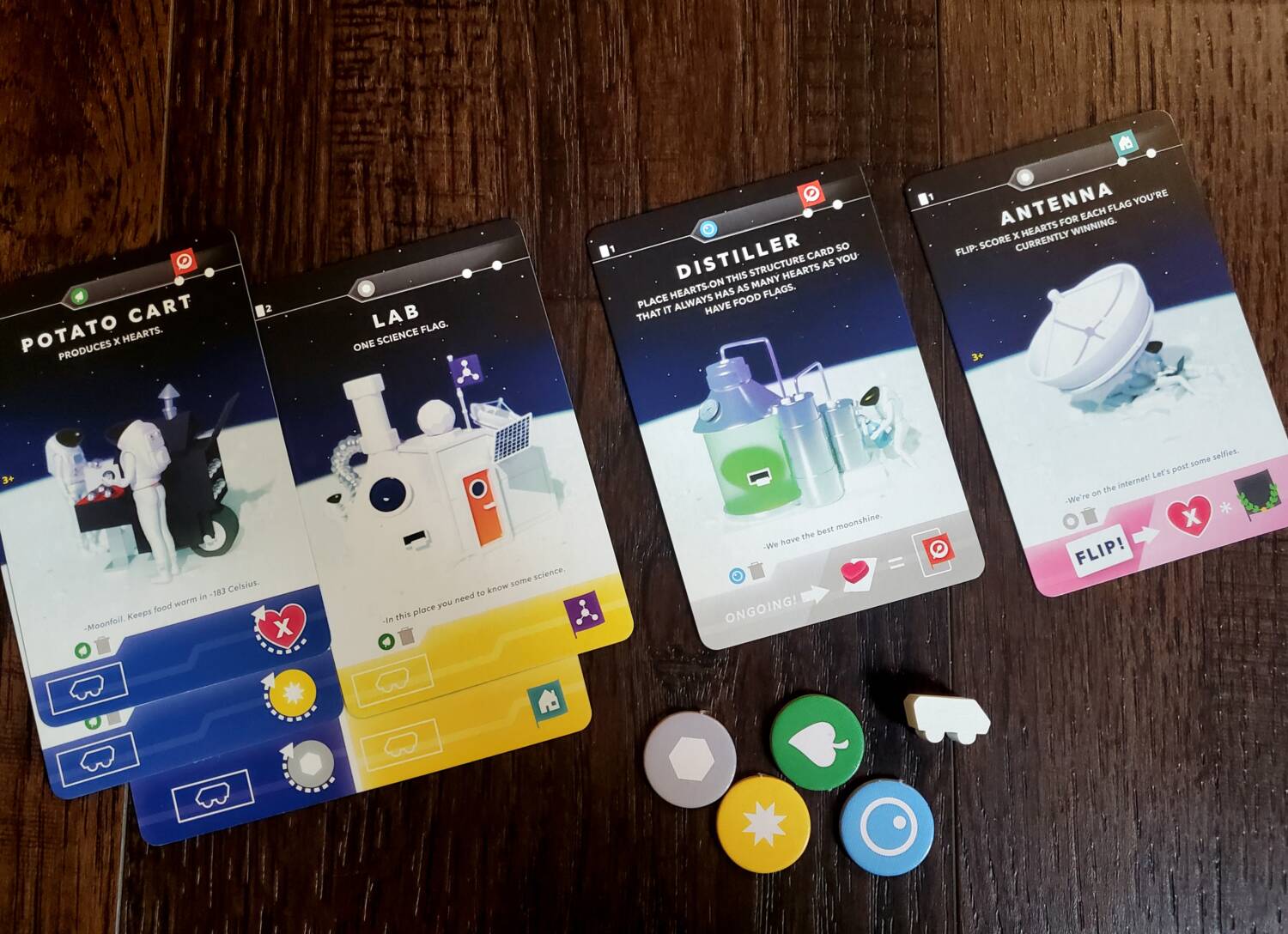
Two specifics in this draft give Moon its flavor. First, in a moment of need, players may send out one wooden Rover per turn to an opponent’s base in exchange for forced access to their goodies; the Rover’s ownership then changes hands. Second, at the outset of each era, every hand of cards receives an Expedition card—a special once-per-turn ability that may be exercised by the player holding the hand. In this way, every passed hand is unique not only for its dwindling card contents, but for the game-bending action that accompanies it. Players engage the cards, aided by these extras in the attempt to build the most popular base.
Perhaps I should mention a third specific. In a highly thematic design choice, players try to take advantage of a dwindling excitement level—X—throughout the game. Occasionally, cards and abilities interact with X to determine the strength of their boon. The temptation is strong to capitalize on early excitement highs, but doing so is often to the detriment of some other aspect of the base, creating interesting decision points across Moon’s narrative arc.
As player bases grow, nine Reputation cards, distinguished by their difficulty, become increasingly relevant. These cards elicit a race with multiple finish lines as players chase the array of conditions necessary to claim their points and abilities. Some trigger once immediately, others provide a lingering ability, all provide scoring. Typically all nine will be claimed by the game’s end, which means they are an ever-present source of temptation and evaluation.
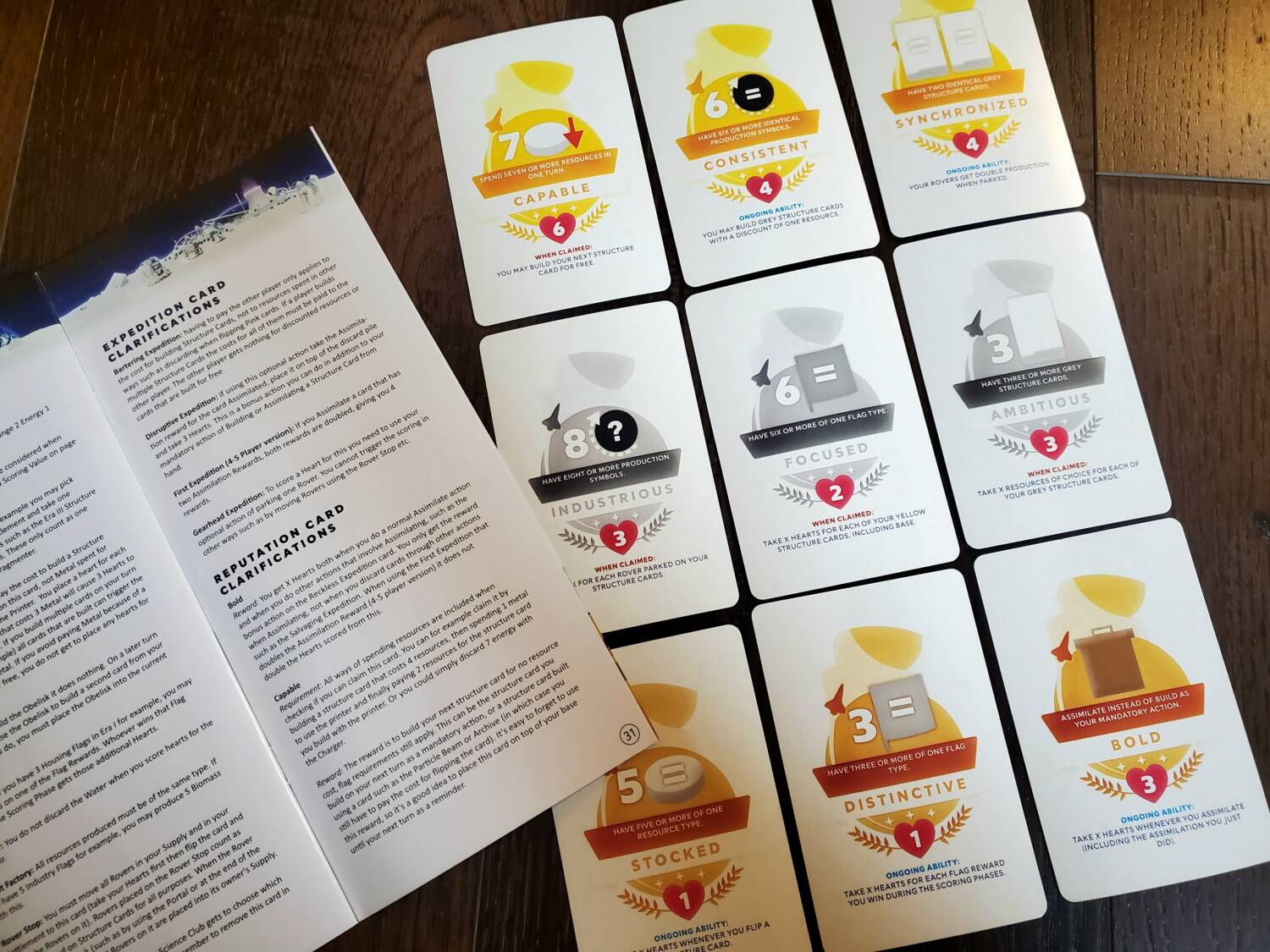
At the end of each era, players enact a scoring phase. Hearts—Moon’s currency of points—rain down upon the players with majorities in each of the five Flag types. More hearts yet fall from the oxygen-deprived sky to equal markers accumulated on cards due to various card abilities. Finally, Excitement fades and new Structure and Expedition cards arrive as another era begins with the production of resources. The third era brings one final scoring tally, this time including the gray endgame cards, on the way to a declaration of victory.
Moon Unit Alpha
Moon is a lovely card drafting experience, leagues more complex and integrated than Sushi Go’s compartmentalized scoring, more wrinkled and widely interactive than 7 Wonders. There are several fabrics to weave with the cards. The five primary resources have ideal, semi-ideal, and less-ideal associated cards appearing in later eras, but there are plenty of opportunities to capitalize on connections and build a productive base. I have been pretty thrilled with the feeling that I have options at every turn.
The Rovers provide a nice vehicle for keeping an eye on the other players. When, in seeking out bio icons to nab for my own purposes, I realize how my friend across the way has built a small green empire, I might then find myself attentive to the lucrative cards being passed around. It’s easy enough to assimilate a card that might help an opponent, or to exercise an Expedition ability to send a card to the discard pile. (Of course, there are other cards and abilities that resurrect and reverse such decisions, but it’s worth a try.) In a similar way, the constant competition over flag dominance raises the need for shifty eyes and base awareness. When the dust settles on Moon, you know you’ve been in competition.
When it comes to personality, the flavor text on the cards is worth a handful of chuckles throughout the game. And the decision to include drive-in theaters and taco stands on the moon keeps the mood light. Moon is the sort of game that invites reading beyond the iconography and generates smiles, which is always a plus in my book.
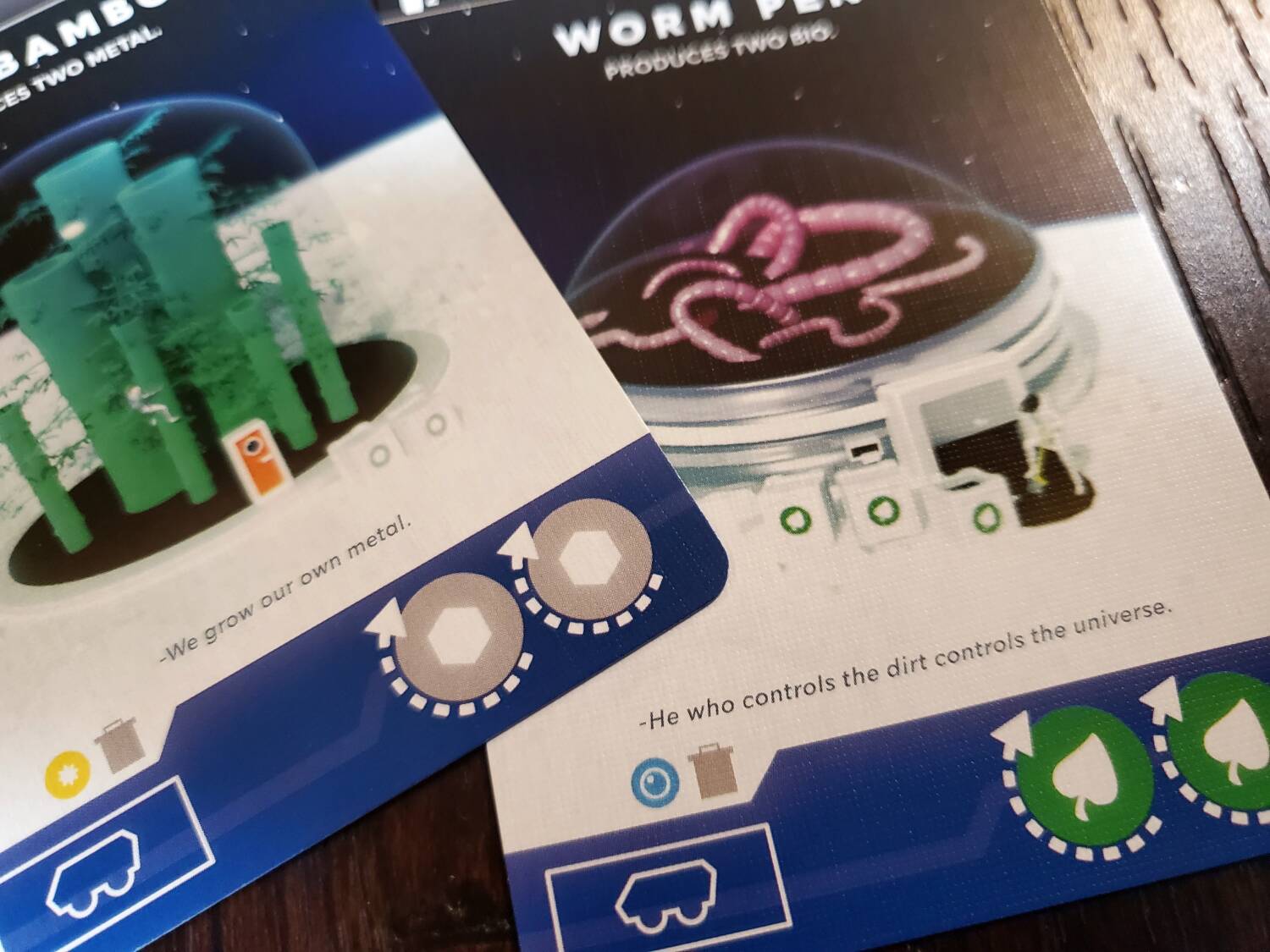
I love the way the eras unfold and the game grows more intricate across the hour. Building a free Toilet in the first era is an easy onboard. Triggering a third-era combo of Expedition card and pink Ability to lay both a Resource card from the hand and a helpful gray card from the previous era deck (with the aid of a Rover), finally capturing a Reputation card, is downright satisfying. The game introduces its finer points along the way.
Moon Unit Zappa
The Reputation cards are a bear in the first play, but they become more approachable in subsequent visits. Giving any new player nine conditions and nine unique benefits to watch for and collect in a game they’ve never seen before and do not fully understand is tantamount to cruelty. Thankfully we were all rookies in our first play, because my goodness we were oblivious to our accomplishments! At least our collective ignorance meant no one really gained an advantage. Something about these cards makes them more prickly for newbies and forgettable at times even for veterans.
The only real drawback of gameplay is that, unlike other stalwart drafting games, Moon starts to drag with more players. The potential use of Rovers means simultaneous play is out. One of my favorite parts of Bunny Kingdom or the aforementioned drafting mainstays, is the “one, two, three, flippy,”—yes, in my house, we say flippy—and the simultaneous reveal. Moon is a more narrative experience as players walk through their turns one by one. I cannot think of a time thus far when two players would have tried to use a Rover on the same tag on the same turn, but I guess it’s theoretically possible. And while it is nice to receive the slow burn of card-by-card revelation to influence every single decision, I prefer a more radically changing state of affairs as four or five cards hit the table at the same time. Three players create the most silky experience, followed by four; but they all leave me wanting simultaneity.
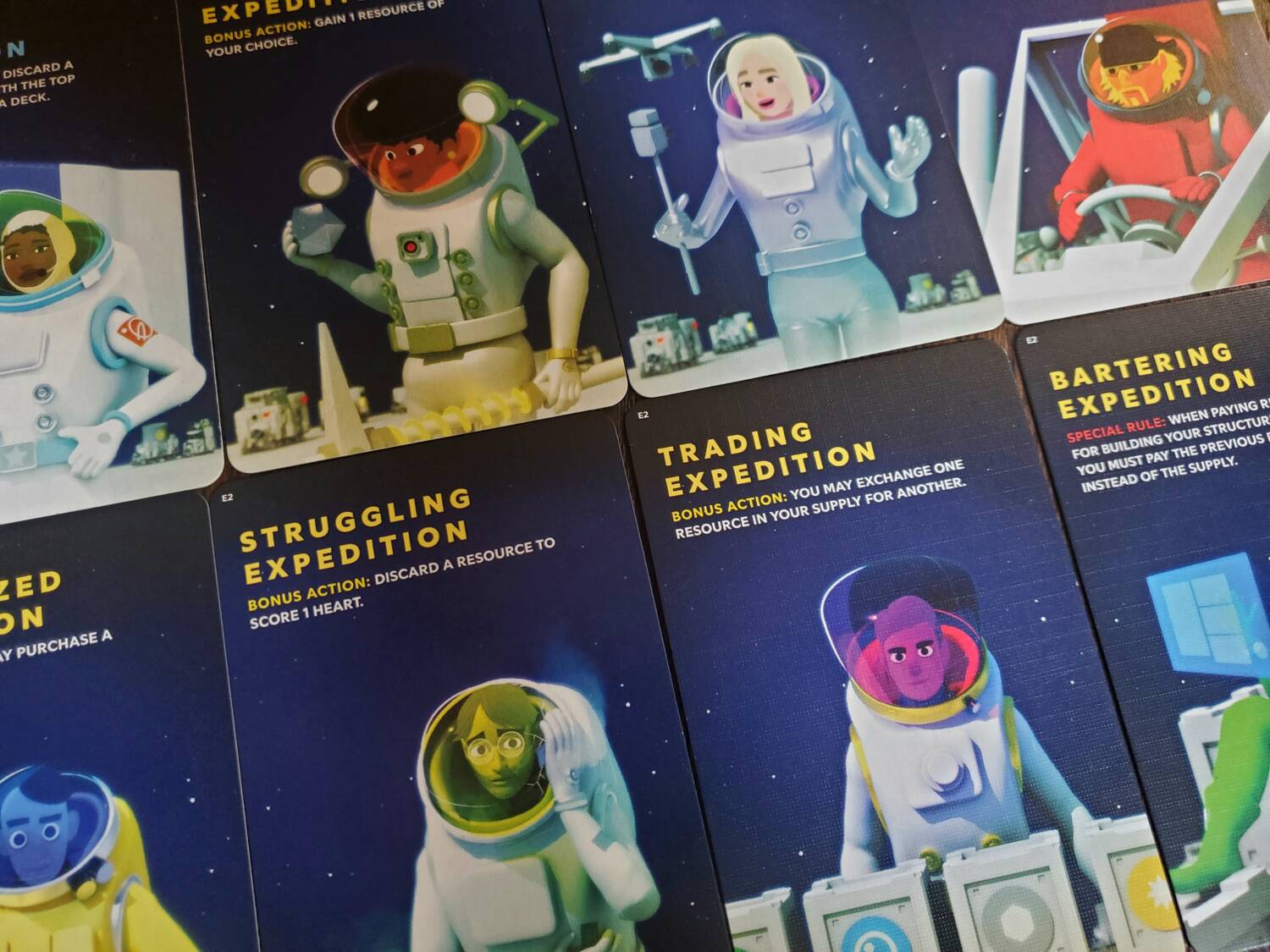
As in most cases, two-player drafting removes a layer of intrigue and belovèd disappointment that hinders the experience. It’s less likely that you’ll step on each other’s toes and just a little too easy to get what you want in a duel, even with a few more cards removed. I like the tension of more players, but there are unfortunate limits here. With three, you’ll see each hand (with each Expedition card) multiple times and you might just get what you want. With four, you’ll see some hands twice and you’ll enjoy thinking on your feet. Then again, you might not, but that’s part of the experience as well.
I have one component issue as well. The hearts. I appreciate the double-sided use of the hearts, printed three on one side and blank on the other to count as singles. What I wish is that Sinister Fish had chosen any other symbol or token to mark cards for future scoring. As players place hearts on a card, those hearts eventually score as points, but the doubled use is less intuitive and potentially confusing. Even a separate, distinct heart token, wooden or cardboard, would eliminate a rough edge. Having taught the game several times now, I’ve yet to walk away happy with the situation.
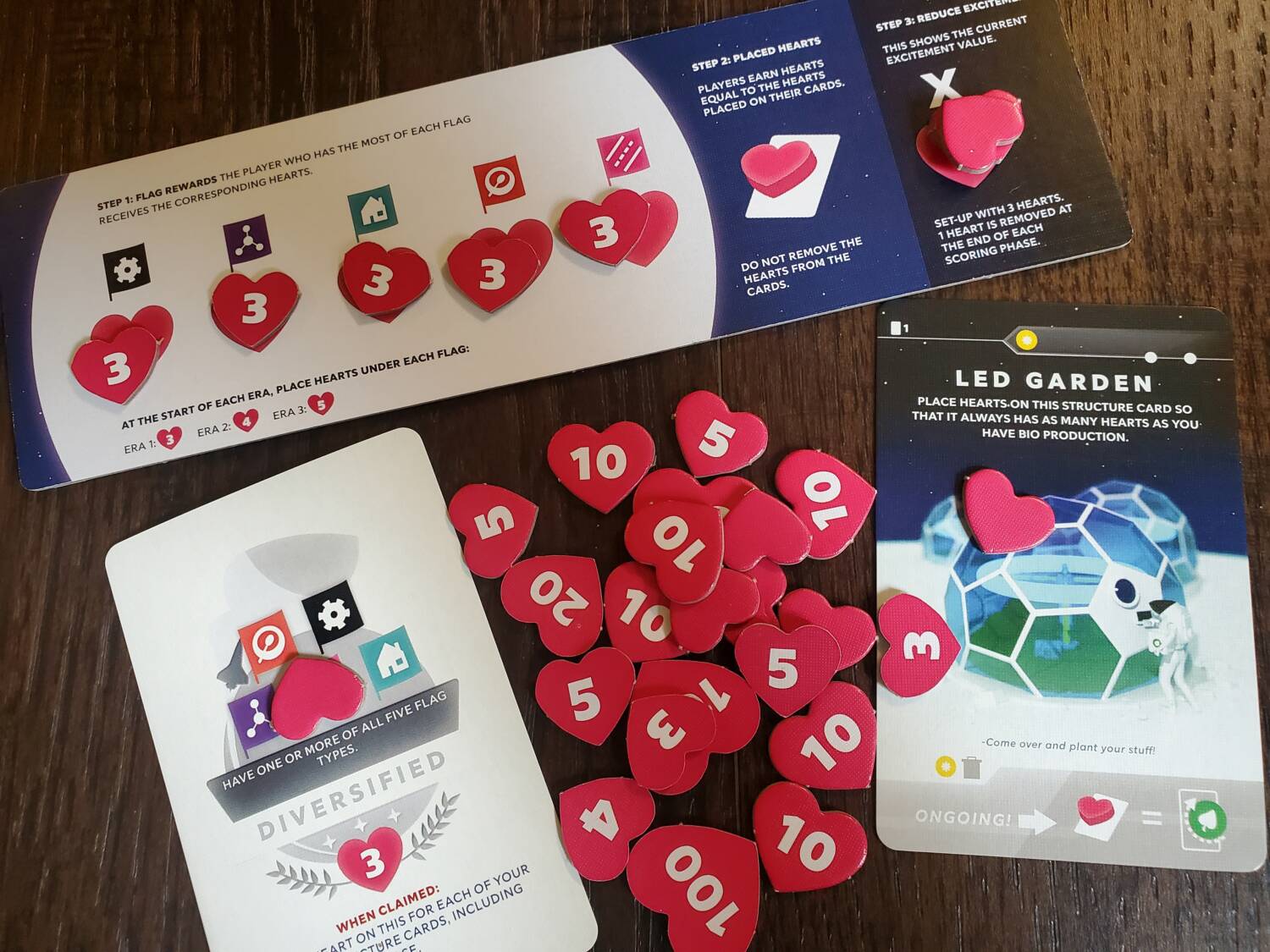
Why make trillions when you could make—billions?
Minor complaints aside—and believe me, they are but minor complaints—I love Moon. I can’t give it that fifth star when I keep lingering on what-ifs about the design. I could almost break my own personal no-half-star conviction to get it close, but I have my principled reasons for holding steady to whole numbers. Allow me to say it this way: if you like drafting, play Moon. It’s wonderful.


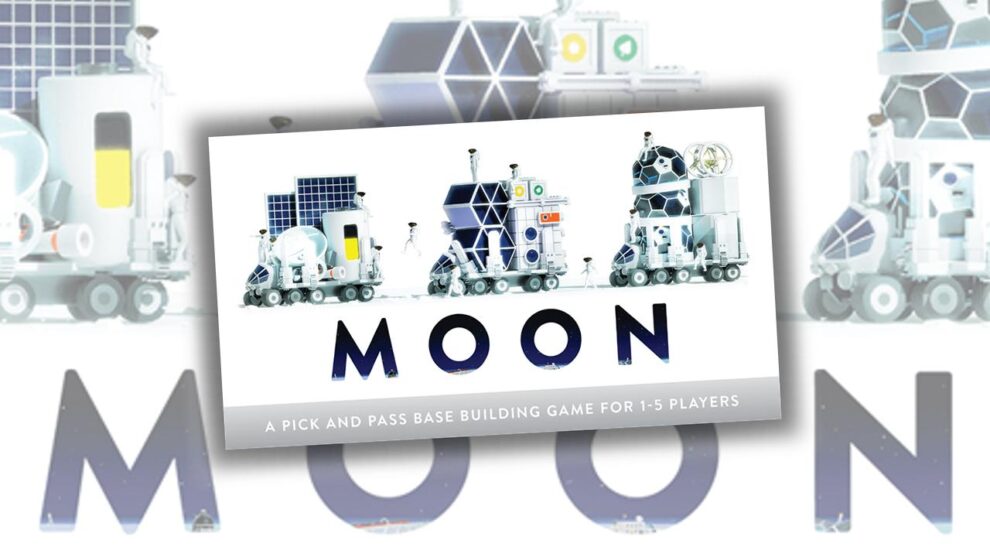




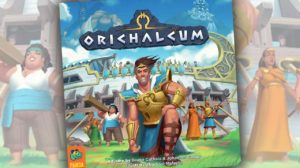




Add Comment